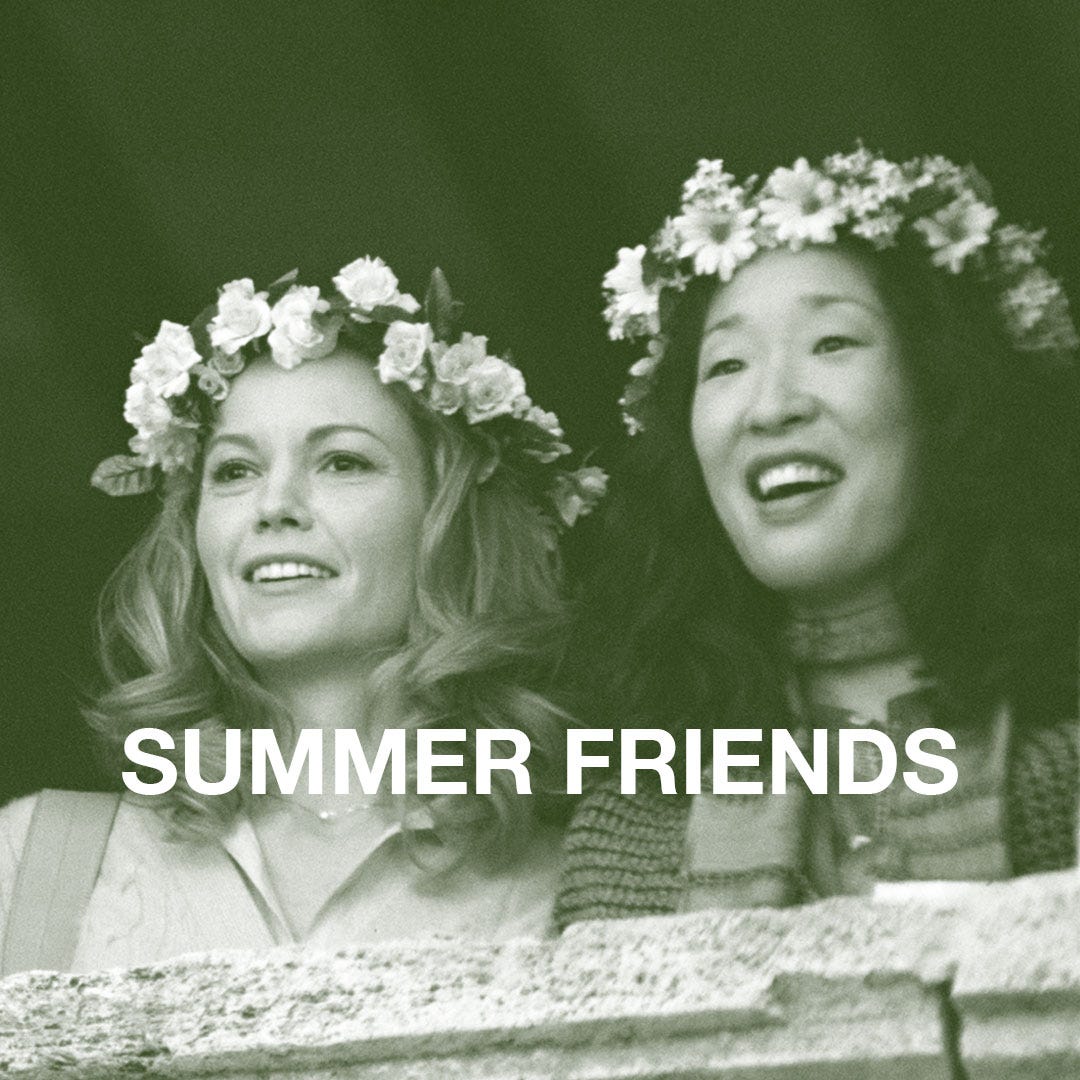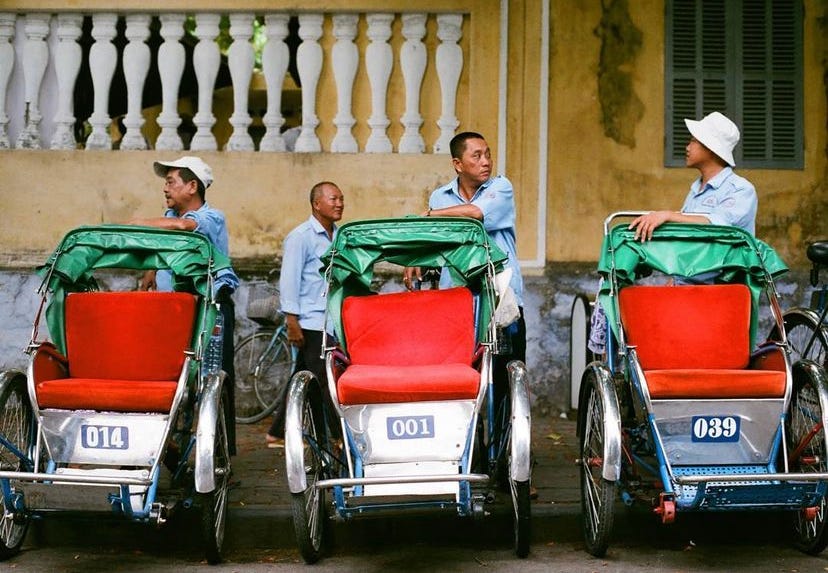In 2003’s Under the Tuscan Sun, writer and divorcee Frances Mayes (played by Diane Lane) relish in the Roman summer heat. Her white linen dress swifting through the city that is foreign yet familiar. In her search for a new life and freedom in Italy, she stumbles across an Italian stallion named Marcello. He took Francesca three hours away to a coastal charming town and later spent a wonderful and loving evening together. Over the course of the movie, the two continuously fail to cross paths repeatedly — only when Francesa courageously shows her cards does she find Marcello in the company of some other girl.
And of course, the other girl appears through the balcony. “Marcello,” she calls him dearly like old pals, in Italian, “we’re going to be late.” Although in disbelief, Francesca saw it all coming. He’s a man after all. She plays perfectly to the camera, as she fixes her hair and recomposes herself against the golden Tuscan sunset. Marcello asks her, “Do you regret this?” almost leaving her no choice but to answer “no”.
Under the Tuscan Sun does not hide its near force-fed fantasy, yet formulaic enough to guarantee commercial success — the combo of the divorcee wanderer; the otherness of Italy (but not too foreign enough to make Italy as a trope a la 2003’s Lost in Translation); the journey of finding love and self-worth; the Polish refugee falling in love with the Italian girl he is not supposed to; and of course the almost redundant Italian summer loving with Marcello. Amidst all eye-rolling cliches and preachy dialogue (“Fefe said "You have to live spherically, in many directions. Never lose your childish enthusiasm and things will come your way."), Sandra Oh’s performance as Francesca’s best friend Patti remains a timeless showcase of a subtleness that Lane very lacks. Near the end of the movie, as Francesca fulfills her wish of “having a family here, having a marriage here,” she turns on the then broken faucet only to find water rushing and wetting her entirety. In an excessive and lazy ending, I found myself grunting and asking — is that it?
The 2003 movie received mixed reviews. Some critics called the film an “alluring example of yuppie porn” and “warmly soothing yuppie-makeover daydream” that goes down “like limoncello — sweet, not very good for you, but irresistible just the same.” One of my favorite reviews by Stephanie Zacharek describes the film as a “sterile fantasy about as sexy as a rusty olive oil can.” There is a certain campiness that comes with the fact that the movie is selling us something purely fantastical — and the rom-com format just is so good (that it’s bad) at hiding it.
What drew me to the movie is its ability to see those foreign fantasies come to fruition — friendships, family, and love. You name it. Yet, watching the film felt like the screen was processed through limoncello that Francesco speak of — indulgent and drunken in italics, a certain sweetness that comes with the naivety (“How much did this b has to live in Italy?”), and the sourness that sets into our being. As much as fantasies inspire us, they stifle us as well. I think about two summers that slanted me and have precariously moved me forward.
Summer 2016 — HoiAn to Ho Chi Minh City, Vietnam
I first met O at a bus station. It was six in the morning in HoiAn — a coastal town and a well-loved gem by locals and tourists alike. My friends and I had just hopped off an overnight bus from the Northern capital city of Hanoi, as we dragged out our luggage trying to orient ourselves in a new locale.
I was too busy eyeing on O — his firm build and brown hair stood out yet blended in with the other passengers. Later that night by the chance of god, we hopped on the same bus as we head to the southern capital Ho Chi Minh City. We were just a little late and realized all the single bunkers have been taken by the fellow backpackers. We ended up snuggling in at the back of the bus, which consist of a wide two sleeper. We talked, naturally — I learned that he is a music student from Birmingham (till this day I think of him when I hear of “Birmingham”). When the night neared, we laid flat on our backs chatting about music, life, books — I told him that we should explore together when we arrive in Ho Chi Minh, and maybe he should come to visit Hong Kong after.
I was obviously smitten — my friends caught on about my infatuation with O as I forcibly included him as part of the entourage for the remainder of our time in Ho Chi Minh City. I remember crossing herds of motorcycles downtown without looking at traffic; I remember hopping on one of our local friends’ scooter ride as we traversed through the French and Chinese districts; I remember eating freshly made Báhn Mìs smeared with chicken pâté; I remember the torrential rain puddled up my sandals; I remember buzzcut hairs, cheap tank tops, and sunburns; I remember learning counting in Viet from one to ten — it was a verdant July in Vietnam.
What is this fantasy about falling in love in foreign places — in a midst of all unknown and new, the desire for the native (or proxy of) if not a play of power. Your senses are heightened: you see more, you eat more, you touch more, you think more — in a land that is foreign to you and you to the land. The traveler puts on myths and performances of an idealized version of themselves because frankly, things are just fun. Marcello from Under the Tuscan Sun says again, “do you regret any of this?”; the prepubescent Elio from Call Me By Your Name confesses, “is it better to speak or die?” Love in the foreign has been well documented in popular media as some kind of predetermined truth that involves total submission and devotion. Eve Kosofsky Sedgwick wrote in “A Dialogue of Love”:
“Oh, right, I keep forgetting, for lots and lots of people in the world, the notion of “falling in love” has (of all things) sexual connotations. No, that’s not what I think is happening. For me, what falling in love means is different. It’s a matter of suddenly, globally, “knowing” that another person represents your only access to some vitally
transmissible truth or radiantly heightened mode of perception, and that if you lose the thread of this intimacy, both your soul and your whole world might subsist forever in some desert-like state of ontological impoverishment.”
And yet, it was over before we realized it. O and I said our farewells, perhaps in one of the corner cafes in the city. The condensation around the glass dripped against the summer heat, attested by time. My pals and I were traveling back to Hong Kong and he flew back to Birmingham a few days later. He asked for my number, “I will come visit soon, I just need to get the money.” I thought this could be something.
Summer 2017 — Hong Kong
I spent the year simmering in my own hatred for not hearing anything from O, only to receive a text from him on one hazy morning — “I’m coming to Hong Kong for a few days.” I thought to myself, love finds a way back. I was very wrong. On the way from the airport to mid-town Hong Kong, he confided in me how he has been having a sugar daddy arrangement with a dentist while working as a waiter — to gather the funds for his travels. I asked him, “Is this affair a sexual one?” to which he responded a matter-of-factly “no”.
We spent a week traversing the highs and lows of my city — tram rides through the hectic Hong Kong island, sky-high escalators that brought us the whole cityscape, the everyday common meals that he found too “foreign”. (Well, in his defense, the Brits aren’t quite known for exciting flavors?). We met up with the pals we traveled with, as I introduced him to my new friend P.
Well, P was studying Mandarin in Hong Kong for a year as a young New York runaway. She hated her time in college and packed up her bags to Hong Kong where her granny lived. I remember her chic bob hairdo and her eclectic wardrobe that came off as effortlessly stylish.
Thinking back, O was probably as smitten for P the way I did for him back in Vietnam. In this transfer of infatuation, it was painful watching O and P grew closer because it felt more than losing both things at the same time. Only when the loosing began, I stop priding myself as a non-possessive lover. We were all on a ferry ride crossing the harbor between Kowloon and the Hong Kong island when P asked me if she spend a night with O. How does someone formulate such a question at all? I remember that particular fluorescent night — drinking Smirnoffs outside of a 7-11 and riding through my anxiety. The city of Hong Kong decomposed into bokeh as I dreaded the short-lived love that I have been longing for. I haven’t seen either P or O since — I know P now goes by another name to honor their heritage.
2022 - Spring — Hamilton, Ontario
I think about these two summers more than I should. I think we all have those summers that have voluminously shaped who we are with certain nostalgic remorse. In those heartbroken love episodes, whether in real life or in popular culture — they all seemed so total and daring.
As I am getting older, I feel more plastic towards love and how popular culture feeds us those summer love fantasies that ultimately rendered more as comedy and a parody of life. In Call Me By Your Name, the narrator Elio carefully courts the mature graduate student Oliver throughout the course of an Italian summer in Crema — bike rides, sensual volleyball matches, piano teases, Roma getaways, etc. The film ends with an eventual farewell as Elio sends off Oliver at the train station. Elio sobs in silence in the car, his mother caresses his son with a cigarette in her hand. In the background, the verdant Cerma remains untouched by that very summer. As the credits roll in, director Guadagnino ends the film with an extended long shot of Elio staring into the fireplace. The audience is forced to sit with the pensive Elio — a narrator that perhaps is hurting but more courageous. It is now winter in Crema. It is snowing outside.
The allure of summer loves is that it’s a self-fulfilling prophecy, and it can get scary to some. Especially in precarious times like now, to talk about love is to almost cheapen the tragedies happening in every corner, but somehow saying “love” makes us feel more human albeit its transcience. As much as I describe love’s mythical qualities in movies, how much of that is conditioned by the very real things — the limoncello in Under the Tuscan Sun; the soft-boiled egg in Call Me By Your Name; the milkshake in Grease, etc.? I want those things. I want the real thing — I want the heat, the turmoil, and the snow after.
If you enjoy my writing, please consider clicking below and buying me a coffee below! I also appreciate you sharing this with your friends!






